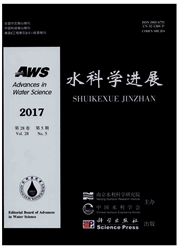

 中文摘要:
中文摘要:
水库对其下游河道水温影响是目前水电工程环境影响评价的重要内容之一。在分析水库干扰后的河流水温波动特征的基础上,构建了水库对其下游河道水温影响的评价指标:基线偏离指标、相位偏移指标和极值变幅指标。对各指标含义进行界定并建立其函数表达式,提出水库对河流水温影响的指标评价方法。选取黄河上游已开发梯级水库为例,应用提出的指标评价了该梯级水库对河流水温的时空影响。研究表明:对于不同调节类型的水库,指标能够敏感地辨析水库对河流水温季节性波动、水温滞迟和均化作用等影响;也可判别其对水温影响的主要特征。此外,针对受影响河段的不同位置分析各指标的波动趋势,可揭示梯级水库对其下游河道水温累积影响的变化程度。提出的指标具有通用性,可为其它流域开展水库水温影响研究提供科学参考。
 英文摘要:
英文摘要:
Assessing the influence of reservoirs on downstream water temperature constitutes an important part of environmental impact study for hydropower development. A set of evaluation indicator system is established from the per- spective of downstream water temperature fluctuation. The latter is the result of reservoir-induced temperature changes in downstream waters. The evaluation indicators include the baseline deviation, the phase shift and the extreme change. Each indicator is defined and the corresponding formula is provided. An evaluation method using the indictors is proposed for assessing the influence of reservoirs on downstream water temperature. The cascade reservoirs on the upstream of Yellow River are selected for a case study in an effort to test the proposed evaluation indicator system and the evaluation method. A spatial and temporal evaluation of the influence of reservoirs on downstream water temperature is conducted. The result shows that the evaluation indicator system and the evaluation method are able to adequately reveal the seasonal change of water temperature, as well as its time lagging and flattening resulting from reservoir operations. The main characteristics of water temperature variation can also be determined by the system and the method. Furthermore, through analyzing various indicators at different river reaches, the cumulative influence of cascade reservoirs on downstream water temperature can be revealed. The evaluation indicator system and evaluation method provide a general methodology, and can be applied to other river systems to study the influence of reservoirs on downstream water temperature.
 同期刊论文项目
同期刊论文项目
 同项目期刊论文
同项目期刊论文
 期刊信息
期刊信息
